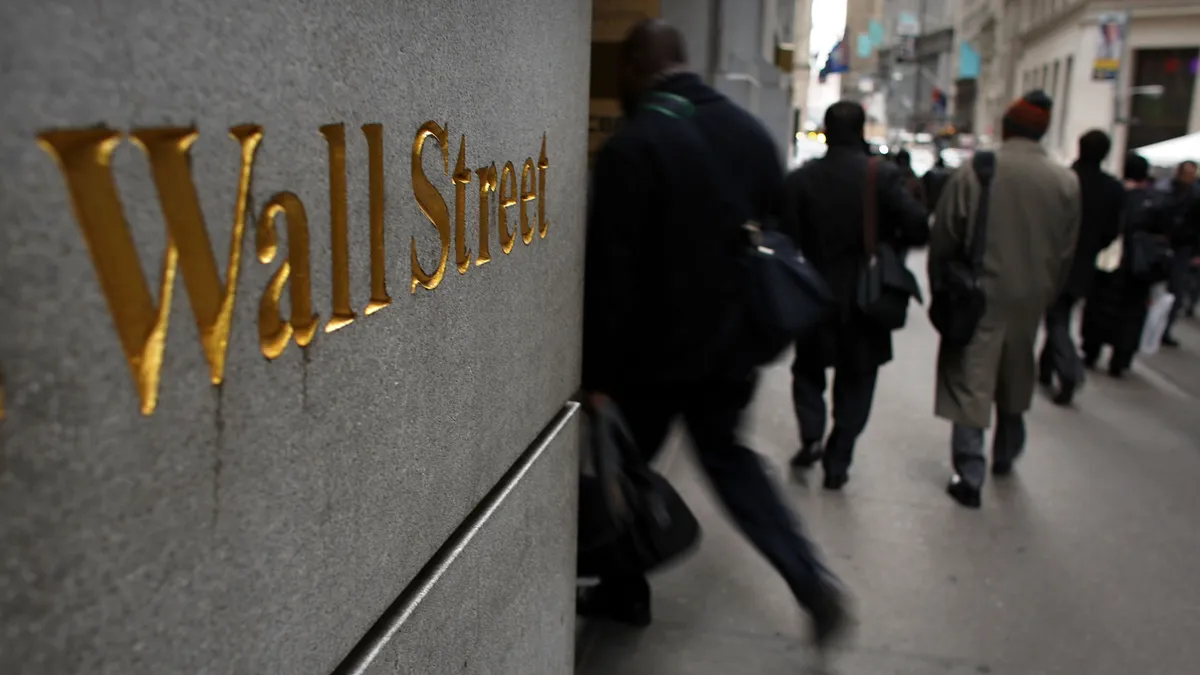Dive Brief:
- Top 10 contractor Tutor Perini reported profits Thursday of $29.3 million, or 57 cents a share, in the fourth quarter, down 17% from the year-ago period reflecting a slowdown in construction. Still, the weaker results beat Wall Street’s average estimate of 51 cents per share, according to Seeking Alpha. Full-year profits totaled $91.9 million versus $108.4 million.
- The Los Angeles-based firm posted $1 billion in revenue for the quarter and $4.6 billion for the year, down 23% and 13% respectively, from the year-ago periods.
- Tutor Perini ended the year with a $8.2 billion backlog of projects, basically flat from 2020. However, the firm clocked $4.5 billion in new awards, including the Los Angeles International Airport connector and the I-70 Missouri River Bridge project.
Dive Insight:
Tutor Perini's results were released just after the New York Stock Exchange ended a tumultuous day of trading following Russia’s invasion of Ukraine. Tutor Perini's shares hit a 52-week low of $10.68 during the day, but closed up 2.5% at $11.32.
On Friday, investors will have time to digest the full financial results and the company’s lower guidance for 2022 profits of $1.15 to $1.60 a share. Analysts had been projecting profits of $2.06 per share.
Tutor Perini, which prides itself on a history in civil construction that dates back to 1894, blamed the reduced profit forecast this year on more of its revenue coming from its lower-margin building division, as well as a higher expected effective tax rate of 22% to 24%, far above last year's 16%. That lower rate was due to the company claiming an $8.2 million tax credit, after revenue it previously paid taxes on in 2016 was deemed uncollectible.
The firm said that during 2021, its civil segment operating margin was 12.7%, the highest since 2014. But those margins were offset by underperformance in its specialty contractors segment, which focuses on electrical and mechanical work, and a reduced volume in its building segment.
The firm built most of its backlog during the year in those two underperforming businesses, while fewer new jobs materialized in its more profitable civil segment.
"Civil lagged significantly not only in 2020, but even more so in 2021, because the sector was basically frozen by COVID and a lack of funding," CEO Ron Tutor said on a call with investment analysts.
After knocking its government customers for being slow payers on its 3Q conference call in 2021, the firm said it expected to generate improved operating cash as the result of projected solid cash collections and the resolution of outstanding claims and change orders.
Future funding
Long term, the company said its outlook is positive, and hailed the passage of the $1.2 trillion Infrastructure Investment and Jobs Act.
"Funding from the bill will begin to flow to our customers or owners in earnest around the middle of this year," Tutor said. "However, even ahead of the bill's impact, we are already tracking tens of billions of dollars of prospective civil projects that are expected to be bid and awarded over the next two years."
The firm's new awards in 2021, which totaled $4.5 billion, included:
- $385 million of additional funding for mass-transit projects in California.
- The $269 million Yountville Veterans Home in California.
- The $162 million Tinian International Airport aircraft parking apron and taxiway project in the Northern Mariana Islands.
- The $152 million Santa Rosa Courthouse project in California.
- The $122 million military range project and a $98 million military housing project, both in Guam.
- The Cedars-Sinai Marina del Rey Hospital in California (contract value was not publicly announced).
- $434 million for various civil segment projects in the Midwest.
On the call, Tutor also highlighted four recent bids for which the company came in second place, including the $2.3 billion Purple Line in Maryland and the $1.9 billion Penn Station access project in New York.
In sum, the four projects were worth $8.9 billion — including $5.9 billion in the lucrative civil market — but Tutor said he would rather lose them than make a lower bid that would put the company's future at risk.
"If we're going to add $5 billion or $6 billion worth of civil work to our backlog and it takes five to six years to build it, nothing would be more foolish than for us to cut our margins in order to acquire it," Tutor said. "It'd be exciting when you got it, and then you'd live with it for the next five, six years."
Tutor Perini's results followed generally sluggish reports from its peers.
Fluor and Lendlease both reported hundreds of millions of dollars in losses in their most recent financial periods, while Jacobs and Skanska each saw profits fall. Of large contractor and engineering firms, only AECOM has posted mostly upbeat results, showing improved profitability and raising its guidance, in spite of its revenues falling slightly.














